Government Employees Have Delinquent Tax Balances – Various government workers have been in the news recently for their delinquent taxes. One article reported that over 1100 IRS employees who owed back taxes and had other tax related problems had, in fact, received bonuses. Another recent report divulged that, as of September 2013, various federal government employees and government retirees owed over three million dollars in unpaid taxes. In a nutshell, it appears that government employees are no different than the general population of taxpayers. Some do not pay their tax bills.
A recent audit of the IRS revealed that over 1000 IRS employees who were in violation of one or more of the tax guidelines set by the very agency they work had received bonus pay in spite of their noncompliance. The Treasury General for Tax Administration reported that the IRS employees who had received bonus compensation had various tax violations including back tax balances, the underreporting of income and late tax payments. While the IRS is not currently required to withhold bonuses for tax law noncompliance, it has said that it will work toward changing this policy based on the recommendations of the recent audit. In a recent statement, IRS officials said they “recognize the need for proper personnel policies” and will “strive to protect the integrity of the tax system.”
Another recent report discussed the delinquent taxes owed by government employees in general. According to his study, members of Congress have a higher percentage of delinquent taxpayers than the IRS. While the Treasury Department, which includes the IRS, has a 1.2% rate of noncompliance, the percentages are 3.24% for Senators and 4.87% for members of the House of Representatives. Results of this same study showed that the departments with the highest noncompliance rates were the Department of Veterans’ Affairs and the Department of Housing and Urban Development with rates of 4.38% and 5.29 % respectively. Off the large governmental agencies, the worst offenders were the Smithsonian Institution, the Government Printing Office and the Court Services and Offender Services Agency, all with tax noncompliance rates in excess of six percent. According to the IRS data released in this recent study, approximately 3.3% of federal government employees and federal government retirees owe back taxes.
If you have a delinquent tax bill, our tax settlement professionals are happy to discuss your tax resolution options free of charge. For more information about our tax settlement services, call us at 877.889.6527 or visit our website at www.professionaltaxresolution.com. Our experienced CPAs and Enrolled Agents have a thorough understanding of tax law together with the experience to know which tax settlement option will be the best fit for your specific tax delinquency.


